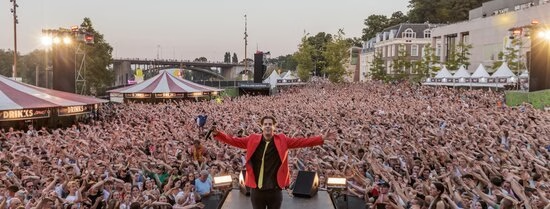How does live music connect people? That’s what Femke Vandenberg (Erasmus School of History, Culture and Communication) studied in her PhD thesis. She attended many concerts in the Netherlands and interviewed concert visitors about their experiences. When the COVID-19 pandemic hit, she also studied how the audience perceived livestreamed concerts.
Most people will acknowledge that music can connect people. But how do live music concerts bond an audience, and is it always the case? That is what Femke Vandenberg studied in her PhD thesis: ‘All together now’, live (streamed) music as a collective practice. During her studies she visited copious concerts, from pop and folk or carnival music (for example Frans Bauer or Snollebollekes) to contemporary classical music, taking surveys and conducting interviews with visitors. “I asked them, for example, what they felt when the crowd started clapping or what they thought of the atmosphere", she explains.
A sonic bond
There are some key conditions needed to create what Vandenberg calls a ‘sonic bond’. For example, to be physically together in the same space, to be aware that you are part of the same interaction and share a similar emotion. “This is an important difference. In a shopping street, people can also be together in a big crowd, but everybody minds their own business and people don’t act as a group. During a concert people’s emotions align, with music working as a catalyst. Simply put: an audience can become connected in joy or sadness following the emotions of the song”.
‘Wij zijn Nederland’
The researcher saw that the sonic bond is the strongest in Dutch folk or ‘levenslied’ music. She attended concerts such as ‘Sterren van Holland’ and ‘Puur Holland’. Vandenberg described this in the chapter ‘Wij zijn Nederland’ which, just like all the other chapters, is named after a song. The sonic bond is the strongest because the audience is encouraged to sing or clap along, participation synchronizing the audience. “For them, the voice of the artist is not the most important thing. They want to have a party, ‘een feestje bouwen’ as a respondent said.”
The audience of pop music (for example Trijntje Oosterhuis) finds other elements important such as the lights during a show or the dress of the singer. “And people that go to classical music are going for more introspective reasons. Their experience is more solitary compared to pop or folk”, she says. In this Vandenberg finds that different music genres allow for more or less social bonding connecting it also to the audience’s social position.

COVID-19 and online concerts
“It was an absolute joy to study this. Not many PhD’s get to go to so many concerts. I also got to travel to all corners of the Netherlands for interviews. I was even invited to their homes or their local bar.” In March 2020 the first COVID-19 lockdown suddenly made (concert) visits impossible. While the researcher was initially disappointed, she explains that it also made her research stronger, as the transition of live music online, added an important dimension to her research. The new development of livestreamed concerts worked to explore how live music is experienced online, and if it can still create a sonic bond.
She found that most people who watched a stream did it as a secondary activity, for example, while cleaning or studying. “I believe digital concerts are never going to replace physical ones. There is no direct interaction, and you can’t see other people’s emotions. The specialness gets lost and visitors miss focus. This means the sonic bond is also not possible online. My research underlines how important it is to come together in the physical space. In times of increasing digitization, this is an important finding, going beyond concerts, showing the limitations of other online gatherings like lectures, and online communication more generally.”
Also, watch a mini-lecture from Femke Vandenberg at Studio Erasmus:

- PhD student
- Related content

